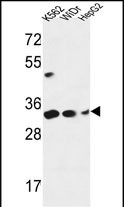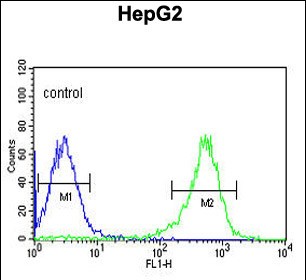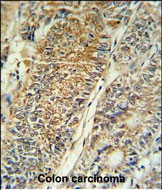


| WB | 1/1000 | Human,Mouse,Rat |
| IF | 咨询技术 | Human,Mouse,Rat |
| IHC | 咨询技术 | Human,Mouse,Rat |
| ICC | 技术咨询 | Human,Mouse,Rat |
| FCM | 咨询技术 | Human,Mouse,Rat |
| Elisa | 咨询技术 | Human,Mouse,Rat |
| Aliases | Pyrroline-5-carboxylate reductase 1, mitochondrial, P5C reductase 1, P5CR 1, PYCR1 |
| Entrez GeneID | 5831 |
| WB Predicted band size | 33.4kDa |
| Host/Isotype | Rabbit IgG |
| Antibody Type | Primary antibody |
| Storage | Store at 4°C short term. Aliquot and store at -20°C long term. Avoid freeze/thaw cycles. |
| Species Reactivity | Human |
| Immunogen | This PYCR1 antibody is generated from rabbits immunized with a KLH conjugated synthetic peptide between 291-319 amino acids from the C-terminal region of human PYCR1. |
| Formulation | Purified antibody in PBS with 0.05% sodium azide. |
+ +
以下是关于CASQ2抗体的3篇代表性文献的简要信息:
1. **文献名称**: *"CASQ2 mutations and clinical presentation in patients with catecholaminergic polymorphic ventricular tachycardia"*
**作者**: Lahat H. et al.
**摘要**: 该研究分析了CPVT患者的CASQ2基因突变,利用CASQ2抗体检测心肌组织中的蛋白质表达缺失,揭示突变导致CASQ2功能异常与心律失常的关联。
2. **文献名称**: *"Characterization of a canine model of catecholaminergic polymorphic ventricular tachycardia"*
**作者**: Cerrone M. et al.
**摘要**: 通过CASQ2抗体在犬类模型中验证基因敲除后心肌细胞钙调控紊乱,证明CASQ2缺失导致钙释放失控,诱发室性心动过速。
3. **文献名称**: *"Post-translational modifications and interactions of calsequestrin-2 in the human heart"*
**作者**: Park H. et al.
**摘要**: 研究利用CASQ2抗体进行免疫共沉淀和质谱分析,揭示了CASQ2在心脏中的磷酸化修饰及其与钙调控蛋白的相互作用网络。
4. **文献名称**: *"Autoantibodies against CASQ2 in patients with autoimmune-associated arrhythmias"*
**作者**: Alimohammad M. et al.
**摘要**: 报道在部分自身免疫疾病患者中发现抗CASQ2抗体,提示此类抗体可能通过干扰钙稳态导致获得性心律失常的发生机制。
这些文献涵盖了CASQ2抗体在遗传性疾病机制、动物模型验证、蛋白质互作研究及临床自身免疫领域的应用。
The CASQ2 antibody is a crucial tool in cardiovascular research, specifically targeting calsequestrin-2 (CASQ2), a calcium-binding protein predominantly expressed in cardiac muscle. CASQ2 is localized within the sarcoplasmic reticulum (SR) of cardiomyocytes, where it plays a vital role in regulating calcium ion (Ca²⁺) storage and release during excitation-contraction coupling. By buffering Ca²⁺, CASQ2 ensures proper cardiac muscle contraction and relaxation. Mutations in the CASQ2 gene are linked to catecholaminergic polymorphic ventricular tachycardia (CPVT), a rare inherited arrhythmia disorder characterized by stress-induced ventricular tachycardia, syncope, or sudden cardiac death.
CASQ2 antibodies are widely used in experimental studies to investigate CASQ2 expression, localization, and function in both normal and diseased cardiac tissues. These antibodies enable techniques such as Western blotting, immunohistochemistry, and immunofluorescence, helping researchers assess protein levels, structural abnormalities, or altered distribution in genetic or acquired heart diseases. Additionally, CASQ2 antibodies aid in elucidating mechanisms underlying CPVT and other calcium-handling disorders, including heart failure. Recent studies also explore CASQ2’s interaction with other SR proteins (e.g., junctin and triadin) and its role in calcium signaling dynamics. As CASQ2 dysfunction is increasingly implicated in arrhythmogenesis, its antibody remains pivotal for advancing diagnostic and therapeutic strategies for cardiac disorders.
×